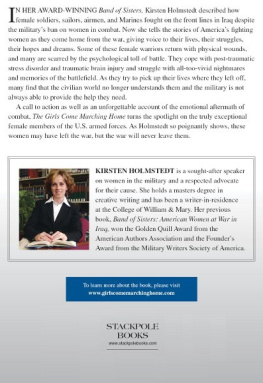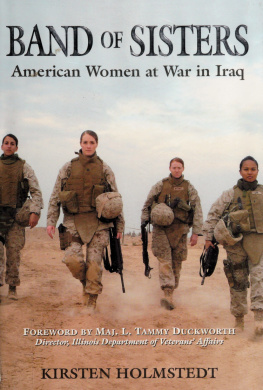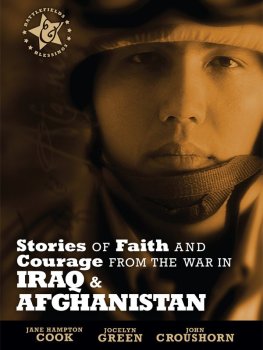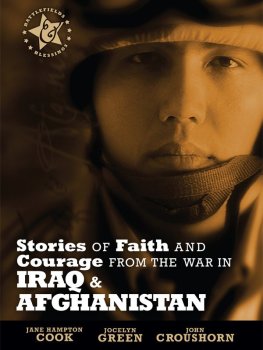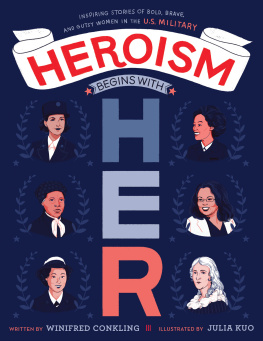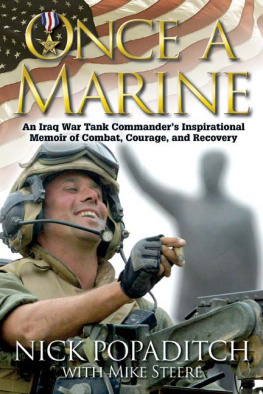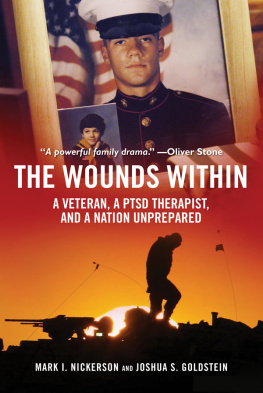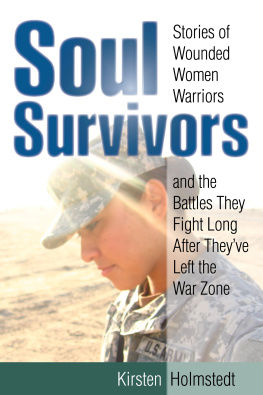THE GIRLS
COME MARCHING
HOME
Stories of Women Warriors
Returning from the War in Iraq
Kirsten Holmstedt
STACKPOLE
BOOKS
Copyright 2009 by Kirsten Holmstedt
Published in 2009 by
STACKPOLE BOOKS
5067 Ritter Road
Mechanicsburg, PA 17055
www.stackpolebooks.com
All rights reserved, including the right to reproduce this book or portions thereof in any form or by any means, electronic or mechanical, including photocopying, recording, or by any information storage and retrieval system, without permission in writing from the publisher. All inquiries should be addressed to Stackpole Books.
Printed in the United States of America
10 9 8 7 6 5 4 3 2 1
FIRST EDITION
Library of Congress Cataloging-in-Publication Data
Holmstedt, Kirsten A.
The girls come marching home : stories of women warriors returning from the war in Iraq / Kirsten Holmstedt.
p. cm.
Includes index.
ISBN 978-0-8117-0516-5
1. Iraq War, 2003WomenUnited StatesBiography. 2. Women soldiersUnited StatesBiography. 3. Women veteransUnited StatesBiography. I. Title.
DS79.76.H653 2009
956.704434092273dc22
2009009214
Table of Contents
For my parents,
Herb and Anne Holmstedt,
and in memory of my dear friend
Thora Morris
Introduction
A timid person is frightened before a danger, a coward during the time, and a courageous person afterward.
Jean Paul Richter
My cell phone showed I had a message. When I listened to it, I heard a slow and trembling female voice. The caller identified herself as CJ Robison, and it didnt take me long to realize who she was. During a visit to the Pentagon, I had talked to a U.S. Army colonel about this book. When I told him I was still looking for women to feature, he immediately responded with a name: First Sergeant CJ Robison. I didnt have a chance to write the name in my small black notebook, but I recalled the conversation with the colonel because he was so persistent. Certain words stood out in my mindfirst sergeant, excellent soldier, female, seriously wounded, National Guard, Iowa. I returned Robisons call the next morning, and the same female voice, one that carried the weight of the war, answered.
Another time, I called Robison and got her voicemail. She had recorded her greeting before traumatic brain injury set in and started to affect her speech. The voice spoke fast and with authority. The contrast between Robisons more recent voice and the one from the greeting left me with the impression that I was dealing with two different people. When I mentioned the commanding voice on her greeting, Robison said, I miss that.
Robisons voice is one of many you will hear in this book, voices I hope you will come to understand and appreciateand never forget.
In 2003, a major experiment began on the battlefield in Iraq as a record number of American women headed into combat for the first time. There were rules banning women from combat, but they dissolved as the war continued and the front lines faded. There was simply no way to keep women from the front lines when the front lines were everywhere. Female military police, truck drivers, medics, explosive ordnance disposal technicians, and lawyers would face challenges that exceeded everyones expectations, including their own.
In my first book, Band of Sisters, I explored the different roles that women were performing in combat, as well as their challenges and accomplishments on the battlefield. We learned through their actions that women can excel in combat. They can return fire when they are fired upon, rescue wounded soldiers, drive trucks on the most dangerous roads, provide security on convoys, and search Iraqi women and children. When they were shot down or wounded, many asked not to go home but instead to return to their troops.
Eventually, most of the women would come homethough more than 100 American women have been killed in combatwhen their deployment was over. The more I talked to our returning female veterans, the more I realized that for some, the war began and ended on the battlefield. But for most, especially those who have gone to Iraq and Afghanistan multiple times, the war followed them home. Still others felt the war didnt even begin until they came back to the States.
For years, men have returned from war with physical, emotional, and mental scars. Thousands of books chronicle their homecomings and rightly so. Men have always fought our wars. However, now women are coming home with the same wounds, and their sacrifices warrant our attention. Like male soldiers before them, some women have become victims of war, and others have been empowered by their experiences. Many fall into both categories: they have been victims but have learned and grown from their experiences.
The same curiosity and commitment that drove me to write about one of the greatest experiments to come out of this warwomen in combatwould also inspire me to find out what battles they faced on the home front. Having followed the progress of women on the battlefield, I now felt compelled to find out how they were doing when they came home. I had to finish what I started, what they started. In Band of Sisters, you heard their voices from the battlefield; now I want you to hear their voices when they came home.
Some women were physically wounded on the battlefield, but all were affected emotionally. In the following stories, you will read how women have or have not been able to reclaim their roles as mothers, wives, daughters, sisters, service members, and civilians while struggling with physical wounds, post-traumatic stress disorder, survivors guilt, and military sexual trauma.
The Girls Come Marching Home goes to the heart of their stories. The voices on the following pages are filled with love and hate, anger and frustration, grief, pain, confusion, helplessness, joy, pride, and hope. You will hear their screams, their cries for help, and their reflections. An Army sergeant voices her desire to extend her deployment in Iraq; when she returns to the States and cant cope, she tries to dull her pain with alcohol and drugs. A Navy anesthesiologists dedication to helping wounded troops is reaffirmed. An Army specialist speaks up when she is sexually harassed; her voice is ignored. A lieutenant proudly becomes the first woman in the U.S. Coast Guard to earn the Bronze Star. While providing convoy security in and around Ramadi, an Army sergeant regularly encounters either an IED, a rocket-propelled grenade, or a firefight. What a relief it is for her to return home, right? Not exactly. Back in Wisconsin, she faces daily battles to get herself and her boyfriend the medical care they need and deserve. An Army judge advocate officer brings her knowledge of the law to the battlefield; she returns with a new awareness of survivors guilt. A Navy nurse and Army specialist are mistreated by fellow service members at home and on the battlefield, but no one seems to be listening. Their harsh language reflects their real and raw emotions.
For a year, I traveled the country and listened to women who had tried to outrun their fears, face their demons, or both. Some avoided help while others pleaded for it. Some wanted to die; others wanted to go on but didnt know how. Some came home to supportive spouses and children while others had to pick up the pieces of a shattered home life. Some became small business owners, continued their military careers and were promoted, started college or re-enrolled, got married, had children. Some used their new voices to become motivational speakers or run for political office. Some embraced their Purple Hearts; others saw the awards as a burden.

